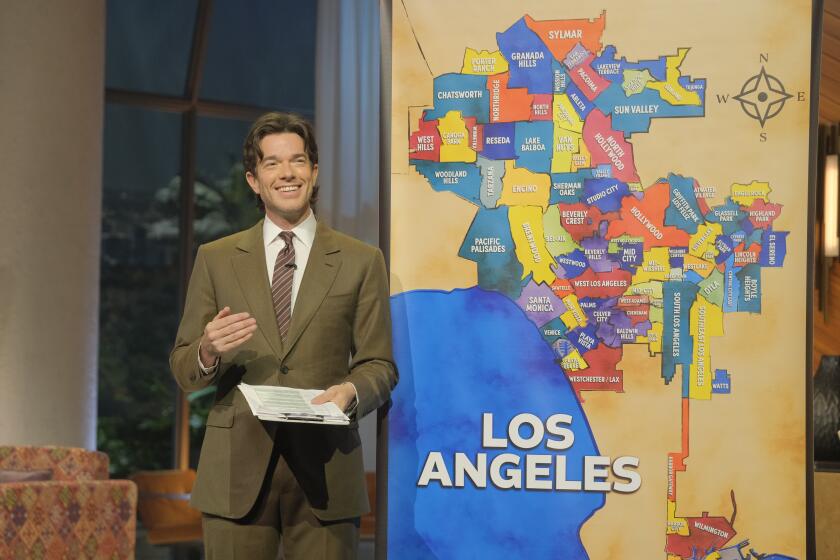Critic’s Notebook: real world concerns about a fantasy ‘Nightingale’
- Share via
Are we really living in a post-racial world? It seems like we’re back in the 1990s, when all hell broke loose on Broadway after the British star Jonathan Pryce was cast as the Eurasian lead in “Miss Saigon.”
The “multicultural” casting of “The Nightingale” at La Jolla Playhouse has provoked a similar backlash, with leaders of the Asian American theater community decrying the way a work set in ancient China has been cast with only two Asian American actors out of an ensemble of 12.
That math is faulty no matter how you calculate it. And on Sunday, a panel was convened at La Jolla Playhouse in which artistic director Christopher Ashley initiated a public dialogue to explain the creative rationale behind the casting and to give a platform to critics who have condemned the practice as cultural misappropriation.
It’s easy to understand the furor. Asian American performers are woefully underrepresented in the professional theater. According to the New York-based Asian American Performers Action Coalition, only 1.5% of all roles were given to Asian American actors in the last five seasons on Broadway.
This is inexcusable — and another sign that the more things change in 21st century America, the more they stay the same.
Yet just as hard cases are said to make bad law, the particular facts of this situation should give all sides pause before they reach any conclusions.
This workshop musical by Duncan Sheik and Steven Sater, the creators of the Tony-winning musical “Spring Awakening,” is being presented in La Jolla Playhouse’s development series known as Page to Stage. Tickets are being sold, though the work is not open to review by critics. This isn’t a finished product and the composition of the cast is provisional.
Both Ashley and director Moisés Kaufman have explained that the staging doesn’t set out to provide a literal view of feudal China. Instead, the work, based on a tale by Hans Christian Andersen, is a theatrical construction in which East and West collide as freely as past and present. This is a mythical space, not readily found on existing maps. The cartography here is a branch of imaginative storytelling.
This “multiethnic” approach to the show, though admittedly problematic given the paucity of opportunities for Asian American performers, has an artistic validity that shouldn’t be dismissed. The theater is permitted to pursue a course of fantasy. Nature and history, of course, aren’t banished from the realm of make-believe; in fact, they can sometimes be magnified.
If La Jolla Playhouse were casting a contemporary realistic work by David Henry Hwang in a color-blind fashion, it would be far less defensible. (Playwriting of this kind seeks a more naturalistic relationship between performer and role.) But this is different and we should be cognizant of the difference, even as tempers flare.
Ideally, art should reflect a demographic inclusiveness. But artists must be allowed to pursue their own visions free of political pressures. If the chief goal of creativity is to correct societal disparities, the work will be parochial at best, propagandist at worst.
Political correctness is a double-edged sword. As a gay man, I am grateful to be a beneficiary of the multicultural movements of the 1980s and 1990s that have had such a profound effect on the way I live my life today. And I’ll confess that I’ve taken offense at the way the “PC” label has been used derisively by cultural and political leaders to stifle egalitarian considerations, as though sensitivity necessarily imposed an undue burden on freedom.
Criticism isn’t the same thing as censorship. Yet I am mindful at how the line between them can blur. A dialectical vigilance is the only solution. This is a fancy way of saying that there needs to be as much listening as speaking out — a balance that Americans, in an age of divided government, have been increasingly challenged by.
Institutions like La Jolla Playhouse need to be reminded that they are underserving entire communities. But those underserved communities need to recognize the right of artists to establish their own conventions of representation. They should also reaffirm the value of nontraditional casting, even as they are right to point out that it hasn’t yet trickled down sufficiently to their benefit.
The post-racial dream is indeed a long way off, but perhaps forums such as the one hosted by La Jolla Playhouse are a step toward getting us there. Ashley and Kaufman acknowledged that mistakes were made, and it’s very unlikely that when “The Nightingale” has its official world premiere that the multicultural production won’t include a more appropriate number of performers of Asian descent. (That precise number is best left to the creative team, but consciousness has undoubtedly been raised by the firestorm.)
These off-stage dramas are always freighted with a backlog of racial conflict. If handled well, as this incident appears to be, there can be movement forward.
Art isn’t a democracy, but it is part of the messy and unending democratic process. Simple answers are often simplistic, but then the best theater depends on an appreciation of complexity.
More to Read
The biggest entertainment stories
Get our big stories about Hollywood, film, television, music, arts, culture and more right in your inbox as soon as they publish.
You may occasionally receive promotional content from the Los Angeles Times.











